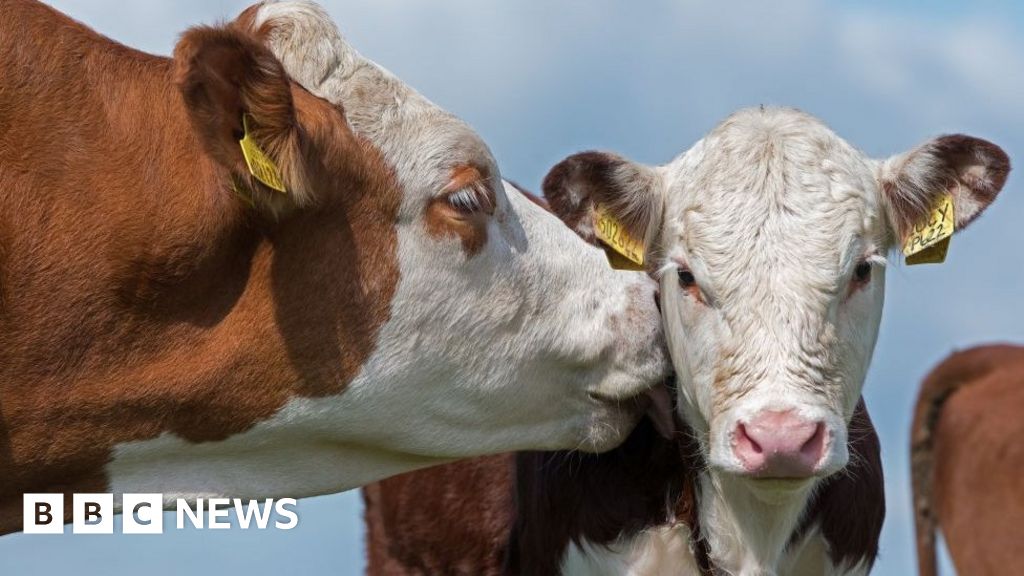UK-Australia Trade Deal: What Are The Arguments For And Against?

By Chris Morris
Reality Check Correspondent
image copyrightGetty Images
The government wants to finalise negotiations over a free-trade agreement with Australia by early June.
It has long argued the UK's ability to strike its own trade deals around the world is one of the big benefits of Brexit.
But British farmers fear it could threaten their livelihood.
How would the deal work?
As part of an overall free-trade deal, Australia wants access to the UK food market - without tariffs (taxes on imports) or quotas (limits on the amounts that can be traded).
This would make it easier and cheaper for big Australian farms to export products such as lamb and beef to the UK.
In return, British farmers (and other companies) would enjoy the same access to the Australian market - that's what free trade is all about.
A deal with Australia would also be an important stepping-stone, the government says, towards joining a wider Asia Pacific free-trade agreement - the Comprehensive and Progressive Agreement for Trans-Pacific Partnership (CPTPP) - which could provide British farmers with huge opportunities.
What's the problem?
An ambitious deal with Australia could see some shop prices fall slightly, because food in the UK is often produced at higher standards and cost.
But this prospect of cheap foreign imports has led National Farmers Union president Minette Batters to warn of the "slow, withering death of family farms" in the UK, if the wrong deal is struck.
image copyrightGetty Images
Critics of the rapid removal of tariffs and quotas also point out a deal with Australia would increase the size of the British economy by only about 0.02% over 15 years.
And if Australia is offered generous terms, they say, other bigger economies - such as the US and Brazil - will want at least as good a deal in the future. So it sets an important precedent.
What does the government say?
Trade liberalisation would be introduced gradually over a number of years and carefully monitored, the government says.
"I am always looking to make sure British farmers will not be undercut by unfair practices from elsewhere," Trade Secretary Liz Truss told MPs.
"We will make sure in all the deals we do that British farming thrives."
But, unsurprisingly, there are differences of opinion within the cabinet.
Part of the debate is about how long it should take to remove tariffs (up to 15 years) and whether any kind of quotas should remain.
image copyrightReuters
What about standards?
Food standards - such as hygiene and animal welfare rules - are an important issue in the UK.
And the World Wildlife Fund for Nature (WWF) notes the government has committed to making sure British farming improves its environmental impact.
"A rushed trade deal with Australia could drive a coach and horses through those efforts," WWF-UK chief executive Tanya Steele says, "and provide a gateway into the UK for foods produced in ways that harm the environment."
The Department for International Trade, meanwhile, says any deal with Australia will "include protections for the agriculture industry" and not "compromise our high standards".
Why the rush?
The government has signed a long list of trade deals over the past year or so but they have been rollovers of those the UK already had as part of the EU.
There is also the new free trade deal with the EU itself, which provides less open market access than EU membership did, as many farmers and fishing communities have already discovered.
A free-trade deal with Australia would be the first big deal that really expands markets.
This makes it politically and symbolically important.
And the government hopes to finalise a deal before world leaders meet in Cornwall next month, at the G7 summit, to which Australia has also been invited.
What might the cost be?
Trade deals are always going to produce winners and losers.
And if Scottish and Welsh farmers, for example, feel badly let down, this could affect:
- government plans to "level up" the UK
- debates about devolution and Scottish independence
But supporters of more ambitious trade agreements say Brexit means doing things differently.
And if the UK cannot make a deal with a like-minded country such as Australia, with whom can it?
From Chip War To Cloud War: The Next Frontier In Global Tech Competition
The global chip war, characterized by intense competition among nations and corporations for supremacy in semiconductor ... Read more
The High Stakes Of Tech Regulation: Security Risks And Market Dynamics
The influence of tech giants in the global economy continues to grow, raising crucial questions about how to balance sec... Read more
The Tyranny Of Instagram Interiors: Why It's Time To Break Free From Algorithm-Driven Aesthetics
Instagram has become a dominant force in shaping interior design trends, offering a seemingly endless stream of inspirat... Read more
The Data Crunch In AI: Strategies For Sustainability
Exploring solutions to the imminent exhaustion of internet data for AI training.As the artificial intelligence (AI) indu... Read more
Google Abandons Four-Year Effort To Remove Cookies From Chrome Browser
After four years of dedicated effort, Google has decided to abandon its plan to remove third-party cookies from its Chro... Read more
LinkedIn Embraces AI And Gamification To Drive User Engagement And Revenue
In an effort to tackle slowing revenue growth and enhance user engagement, LinkedIn is turning to artificial intelligenc... Read more

